Writing a petition titles is one of the most important things a petition starter does on Change.org. These titles—or headlines—are the first thing a potential supporter sees and the only text likely to be read by someone who encounters a petition on social media.
The internet is full of tips for how to write content titles, and much of this advice is backed by millions of data points; however, much of it is also sensationalized and rapidly becoming outdated as yesterday’s innovations become today’s tired clichés. What’s more, a Change.org petition title should be crafted for a diverse, dynamic, socially-conscious audience—on the whole, Change.org’s petition supporters are savvy, passionate, and more likely to resent clickbait titles than be lured by simple gimmicks. Our research here should offer several key insights on how adding crucial key details to a petition title will help you achieve the change you hope for when you start your own petition.
Findings on Longer Titles Upend Conventional Wisdom
One of the most surprising insights we found when looking into the data behind writing great petition titles had to do with the length of petition headlines. We expected our work to confirm conventional internet wisdom: Brief is better. In fact, a quick look at the Change.org data seems to confirm this.
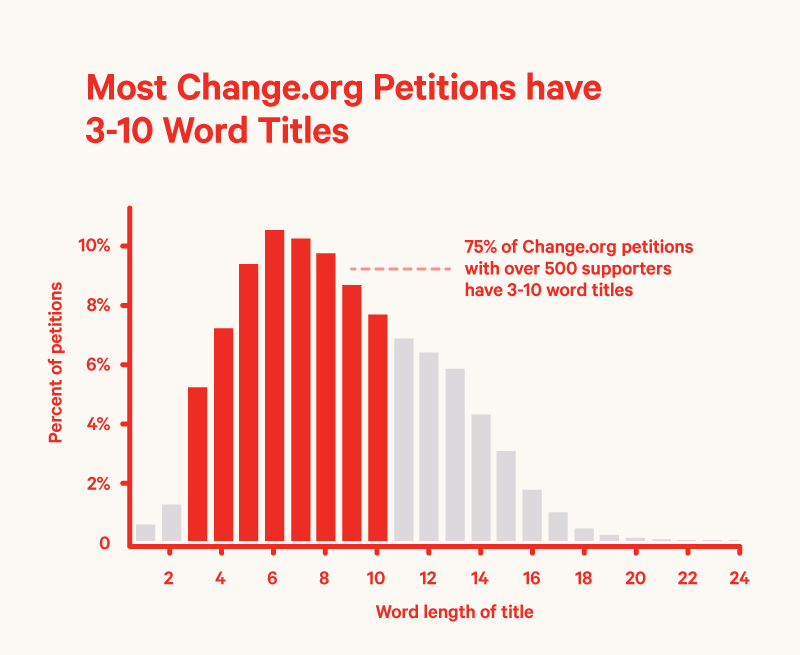
It seems to be an open-and-shut case when it comes to title length: Write short, direct titles that grab a user’s attention. But a deeper look at the data revealed something more interesting: Most successful titles on Change.org are short because most titles overall on Change.org are short. There are simply more short titles than long ones, so of course they see more overall success.
This becomes abundantly clear looking at the median supporter signatures a petition receives relative to its title length. We actually found that supporter signatures peaked at 13 words, which intuitively seemed much too long for these to be good, engaging titles.
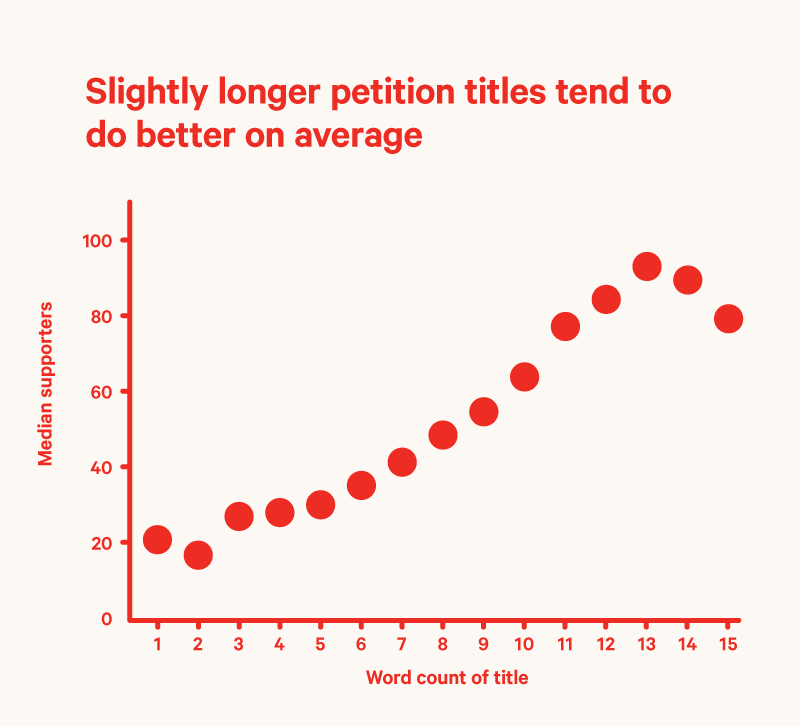
So what are these long titles doing so well? And are they truly better than short ones? Again, titles this long run counter to every narrative about tiny attention spans on the web, but the effect plays out quite clearly in the data from over 164,000 English language petitions.
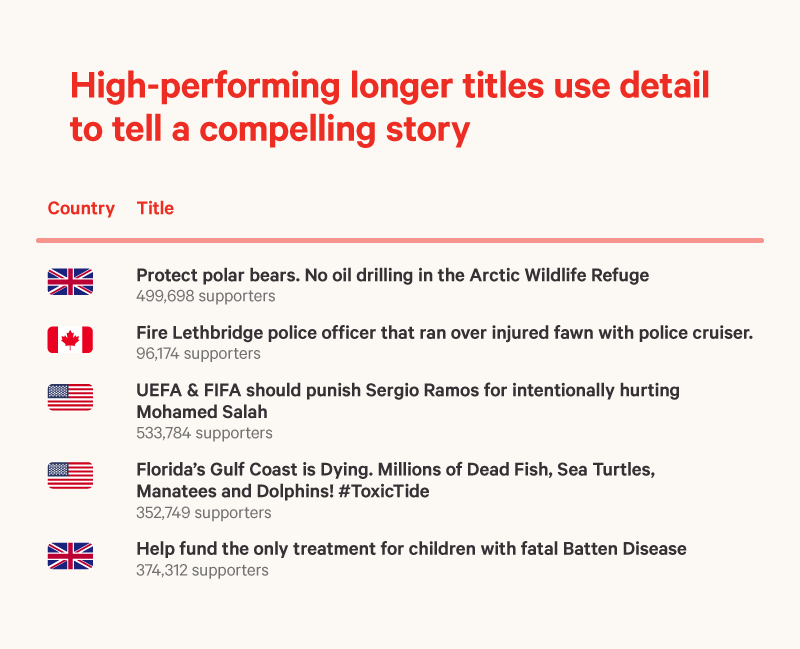
We combed through hundreds of high performing long titles—those with 11 or more words—and found that the best of them are filled with rich descriptors and powerful details, immediately telling a story in miniature.
For example, two highly-successful conservation petitions make specific reference to the living creatures within the environment. Both Florida’s Gulf Coast is Dying. Millions of Dead Fish, Sea Turtles, Manatees, and Dolphins! and Protect polar bears. No oil drilling in the Arctic Wildlife Refuge are fundamentally about the protection of entire ecosystems—the Florida Gulf Coast and the Arctic Wildlife Refuge. Overall, a majority of people support protecting the environment, but research has shown that the idea of conservation can take on a highly partisan tone. By lengthening titles here to include familiar inhabitants of these places, the petition instantly becomes not only about saving nature as an abstraction, but about saving living, sentient creatures.
In other cases, the use of key adjectives, adverbs, and other details fundamentally change the tenor of an entire petition. UEFA and & FIFA should punish Sergio Ramos for intentionally hurting Mohamed Salah is an entirely different title because of intentionally, and seeking support for the treatment for a rare disease becomes deeply personal when it is the only treatment for a fatal disease affecting children.
This is even more pronounced in a Canadian petition involving the killing of a deer. Using the term fawn (which specifically refers to a very young dear, a child) goes beyond simply being accurate—it ventures into the territory of evoking deeper human sympathy than might be brought out simply by calling the animal a “deer.” Moreover, the somewhat redundant use of “with a police cruiser,” given we already know the offender is a police officer, restates the point that this wasn’t just any individual. Police cruisers are symbols of authority in society, and including it as a key detail here serves to reinforce the seriousness of the transgression that took place.
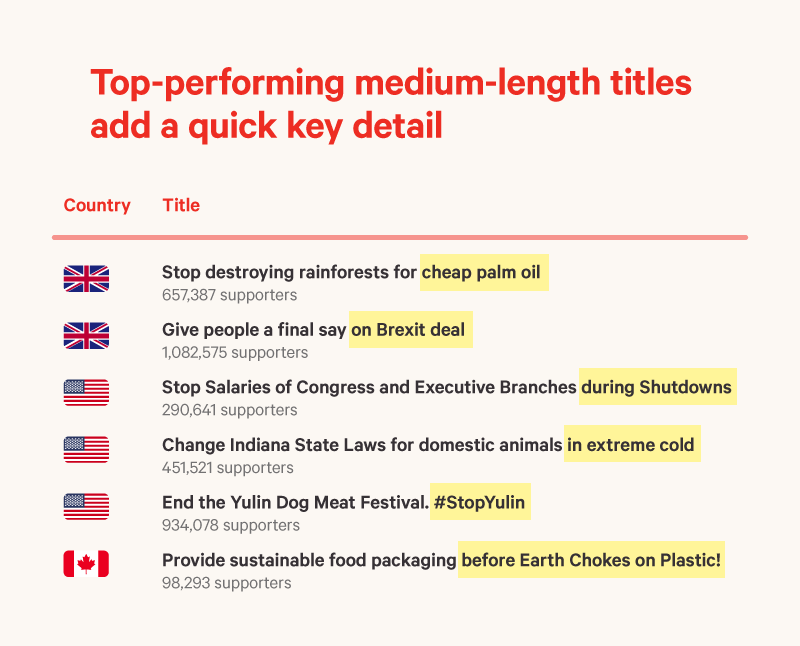
In medium-length titles, there’s often a single additional detail that skillfully adds a world of context to the line. Oftentimes, these come in the form of prepositional phrases that are highly evocative to a potential supporter—they address domestic animals “in extreme cold,” contrast the grandeur of the rain forest with “cheap palm oil,” or use personification of the entire planet, describing Earth as it “chokes on plastic.”
In many cases, these details are deft and dramatic, vividly painting a scene in a single phrase. By adding a highly descriptive detail, these titles deliver dynamic micro-stories designed to inspire both interest and action in a reader who may just be casually scrolling a page.
Short Titles Are Still Tremendously Effective
Of course, the majority of titles on Change.org are short, and with good reason. While our research showed that keeping things brief in a title should not be a hard and fast rule, it can still be tremendously effective.
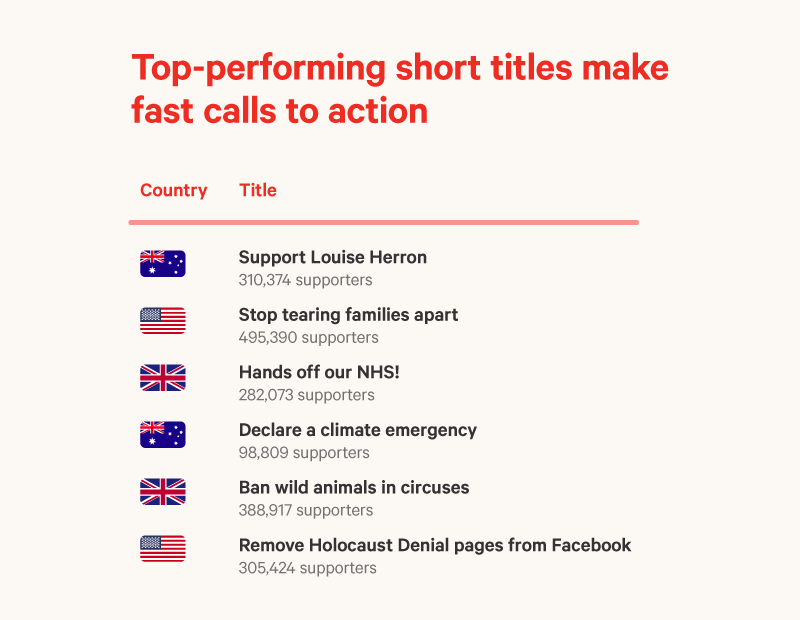
Other aspects of our work delved into the importance of first words in titles, and nowhere is this more apparent than in short, direct petition titles. Nearly all of these titles begin with an action verb, and the ones that don’t all have other immediately identifiable nouns that evoke the interest of the reader. For example, the petition Nipsey Hussle Square launched almost immediately after the murder of the rapper and community activist, and it achieved victory in less than two weeks.
In some cases, though, these titles don’t begin with verbs at all, instead posing a brief statement that reads as so irrefutable, it demands immediate civic action. This is the case with the half-a-million-signatures-and-counting petition Children Don’t Belong in Cages, a petition to the administration of U.S. President Donald Trump over its policies surrounding immigrant detention. The issue itself has become a political powder keg in the United States, in no small part due to the fact that petitions like this one draw hundreds of thousands of supporters to the cause by presenting a situation in its simplest, most devastatingly moral terms.
Worry Less about Length, More About Story
The biggest takeaway from our work was seeing that petition starters are hugely effective in their writing in a variety of ways, from using simple and unforgettable phrases to writing longer titles that engage supporters with meaningful details. What ultimately emerged from this research is that there are multiple approaches, all with their own merits, of writing titles that attract legions of supporters to a cause. The true challenge for any petition starter is to consider the options and ultimately decide on the most effective strategy for winning signatures and support.
The good news is, there is no one way to write a title except to be deeply passionate about a cause. This simple truth shines through in titles both short and long, and the truism that any worthy cause can find its supporters was remarkably clear across all the types of titles studied on the platform. Ultimately, it’s your passion for your cause and your dedication to moving potential supporters to action that will ultimately be the greatest predictor of success when you start a petition on Change.org.
Nick Allardice is the Chief Product Officer at Change.org. Twitter, LinkedIn.

